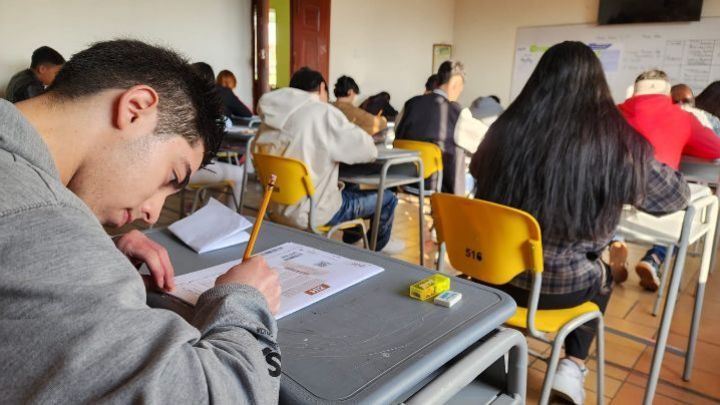As the proctor gives the order to start the exam a palpable tension begins to pervade the air, creating a suffocating silence that weighs heavily on the shoulders of every student. The clock ticks loudly. The pressure of expectations and the fear of failure hangs heavily in the air. It is exhausting and leaves students physically and mentally drained. Fried brains search for formulas, ideas, connections, and names that add up to almost 17 years of knowledge.
On Sunday, April 14th, the annual Pruebas Saber, which in the past determined university entrees to Colombian students, was held around the country. While the Pre-Saber serves as an optional practice, the Saber is a Colombian requirement for graduation, and its results have a significant impact on a student’s future career path and opportunities, making it crucial for them to perform well. The exam includes a wide range of subjects including math, science, social studies, and language arts designed to test critical thinking, problem-solving skills, knowledge, and comprehension.
TCS Seniors Pedro Gomez, Amalia Sierra, and Daniel Villa as well as Grade 11 students Valentina Jimenez and Nicolas Termes, along with certain students from all around the city, were divided between the Politecnico Colombiano Jaime Isaza Cadavid, Institucion Educativa INEM, and Instituto Tecnologico Metropolitano to present the Pruebas Saber.
Over the last couple of years, Colombian universities have shifted from using the ICFES as the sole criterion for admitting students to a more holistic approach that considers other factors such as extracurricular activities and personal statements. This has sparked student debates about the importance of exam scores in determining their future. While Colombian public universities still use the ICFES as an admission factor, and high scores may lead to a scholarship. Many of The Columbus School students, however, believe these tests don’t define university and career success.
“I think that the ICFES is somewhat important for those studying in Colombia, especially those who aim to get a scholarship or enter a public university since most private ones do not even require it. Not even El CES for medicine students, which in the past you had to have a great score to get admitted,” Senior Daniel Villa said.
The debate on the importance of the tests becomes even more polarized amongst students who plan on studying abroad. For Calendar B schools like the TCS, the test dates land right around the end of their school years, meaning most students have already been accepted and even paid their first-semester tuition, with the ICFES not being a condition for acceptance.
“GPA, extracurricular activities, and the IELTS English test were probably the determining factors for my admission into QUT, in Australia. And my friends aiming for Spain didn’t even have to mention they still haven’t done the ICFES,” Senior Pedro Gomez said.
It’s a requirement for Colombian schools to prepare students for the Pruebas, so, certain classes are chosen by the institution to provide tips, information, and activities similar to those in the ICFES Cuadernillo. Most students at TCS believe they have already learned enough and choose not to invest significant time and effort. However, some still feel unprepared and diligently study.
“I don’t believe that one has to study for the Pruebas Saber if the school does a good enough job covering all the topics, but I don’t believe that TCS does that. So I had to study in my own time,” Villa said.
According to interviewees, the hardest sections on both ICFES and pre-ICFES generally had to do with long texts or memory-based questions.
“Reading was the hardest for me because it was long. It wasn’t that challenging, but it was hard not to lose focus,” Nicolas Termes, grade 11 student, said.
Interviewee responses, aligned with previous exam averages that demonstrate Calendar B schools usually struggle with social and natural Sciences. TCS average in 2022 for both of these sections was 61 out of 100.
“The hardest sections were natural sciences and socio-politics. Mainly, because some topics haven’t been taught at school or are contents of elective courses like AP Environmental Science,” Valentina Jimenez, Grade 11, said.
On the other hand, TCS students responded that the easiest section was English followed by Math, and certainly the 2022 ICFES reports proved that the TCS and other Calendar B schools, contrary to their Calendar A counterparts, scored the best in English.
“In my case, math and English were pretty simple. Math was mainly basic logic questions and English is designed for non-native speakers. It’s simple since we speak it daily,” Villegas said.
While some students at the TCS do recognize the Prueba Saber has a certain level of importance, the Pre-Saber has polarized opinions. Some think it helps students learn the actual exam’s structure, others say it’s not as helpful but still do it, and a third group doesn’t even bother taking it.
“At TCS we are very project-based, and we aren’t adapted to long exams that test resistance so the Prueba Pre-Saber in my opinion helps us understand how the actual exam will look like, the times, questions, strategies, and in what areas we need to prepare,” Senior Amalia Sierra said.
It’s a global trend for universities to question the value of standardized exams for college admissions. Colombia has followed that approach with most private universities not even requiring a great score on the ICFES and public universities requiring an additional admission test. This cultural change has sparked mixed opinions amongst students and thus dropped the school’s average score on these tests. Some believe high scores are crucial for top universities and career opportunities, but others.
“Exam results don’t strictly define my intelligence or academic potential. Hard work, determination, and a passion for learning are the true indicators of success,” Villegas said.



